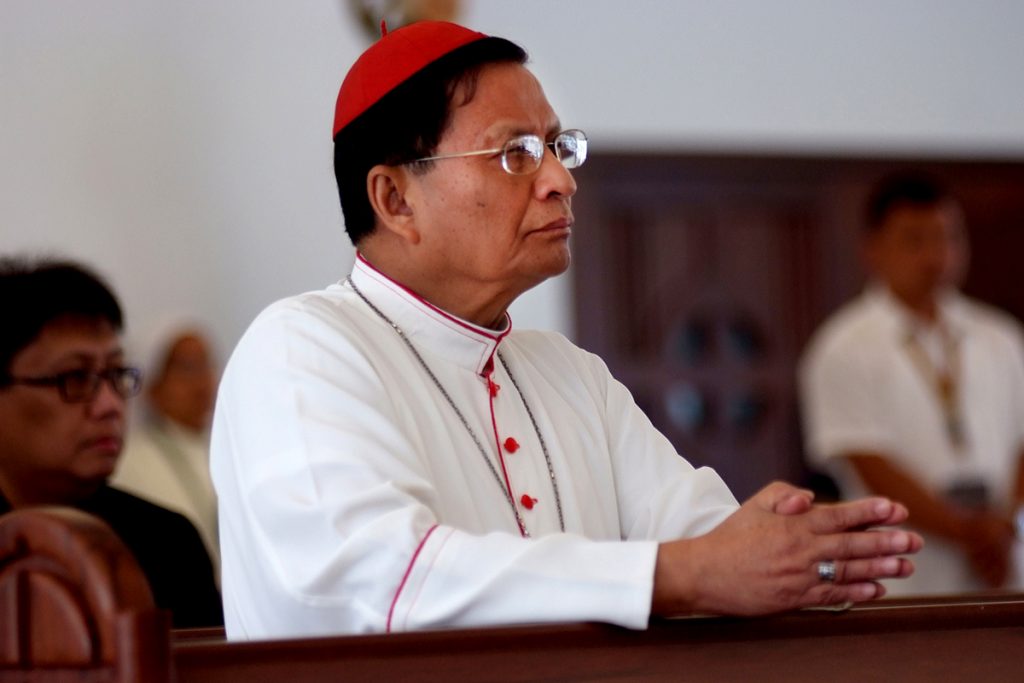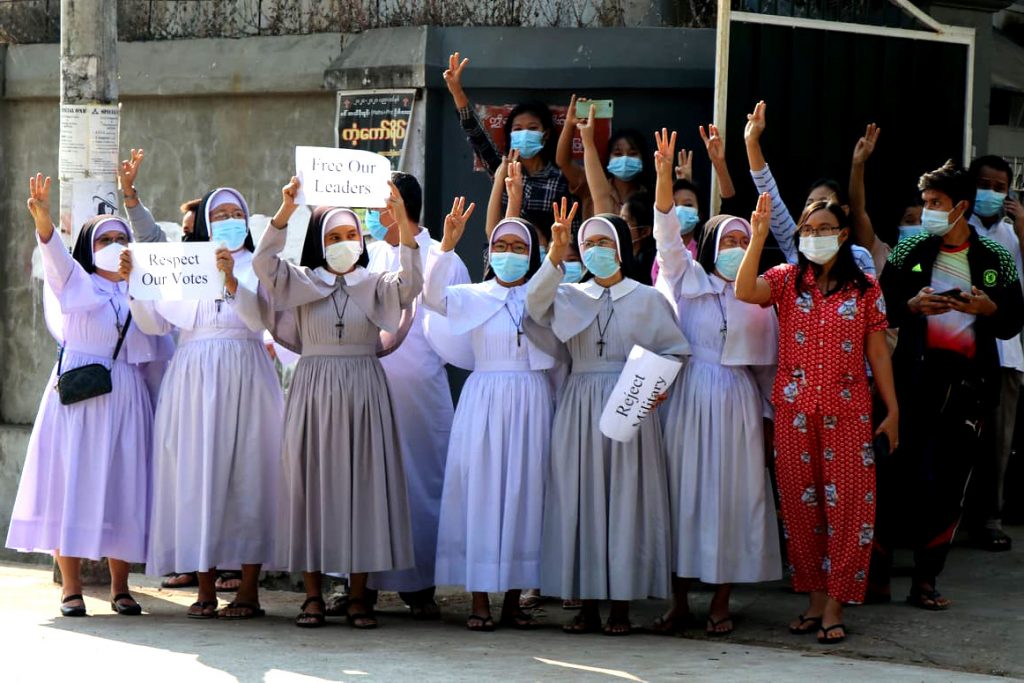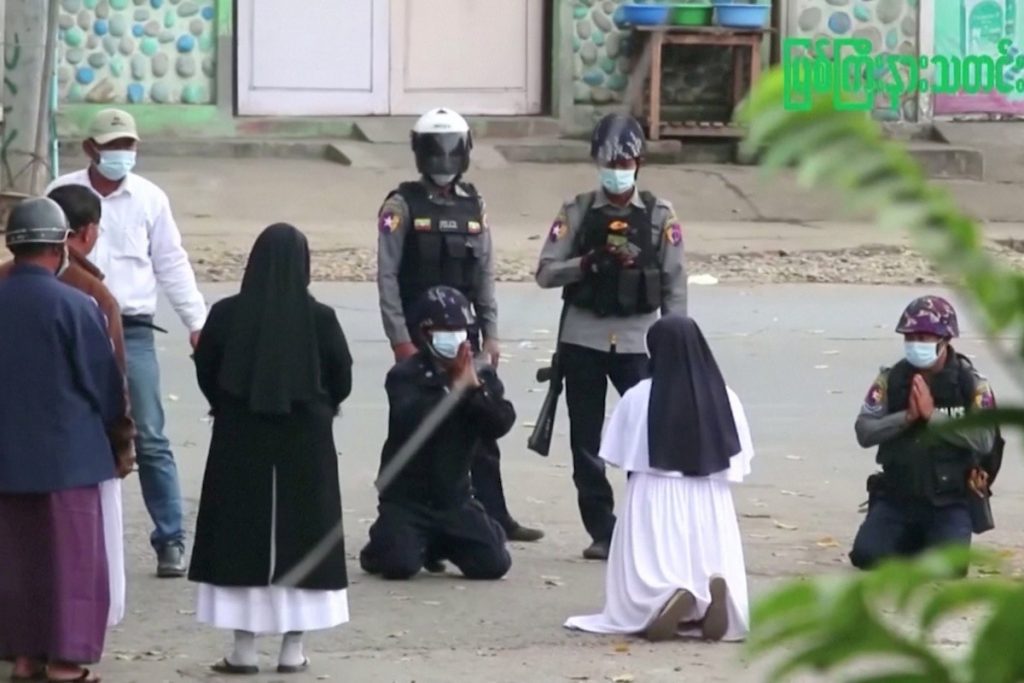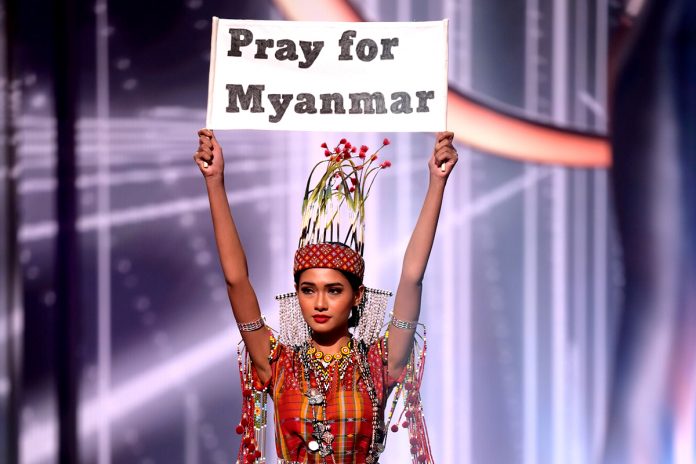Homily of Cardinal Charles Maung Bo of Yango, president of the Catholic Bishops’ Conference of Myanmar, on Sunday, June 20, 2021
Dear Brothers and Sisters in Christ
May the love of the Lord Jesus be with you all. Under the banner of the Cross, we gather today, once again praying for this nation, for peace. We come here to pray for the thousands who are in the jungles soaked in cruel monsoon rains including the children and old people. We pray for Loikaw and Mindat where the Church and all the people are under a very painful way of the Cross. We feel the pain of those innocent people, their tears, their brokenness, their sense of abandonment. We have come to knock at the doors of heaven, for peace.
Today the theme of the Mass is taken from two sources: St Paul encouraging the Corinthians who had tough time, saying that the old things will pass away and it is time for a new world to come. We also meditate the soothing question of Jesus: Why are you frightened? Do you not have faith?
To the more than 120,000 people who were displaced in the conflict zones of Mindat and Loikaw and those who were wounded inside the churches, Jesus’ words are consoling. Without food and medicine, with fear and anxiety, in rain and cold, these people were tossed like the boat we see in the Gospel today. There was a storm and the boat was experiencing monstrous waves and death seems to be very near to the disciples. The evangelist Mark gives the scene with gripping words:
And there arose a great storm of wind, and the waves beat into the ship, so that the ship was filled. And he was in the hinder part of the ship, sleeping upon a pillow; and they awake him, and say to him: Master, does it not concern you that we perish?
Thousands of our people are asking this question today? Lord does it not concern you that we perish? Every broken bone, every bruised heart asks this question. And thousands.
Yes, dear people of Myanmar. We are like those disciples, tossed in the stormy seas of man-made disaster, of unending war, anguished displacement, inflicted starvation, death, detention and despair. How many seas, my dear Myanmar people, have we crossed in the leaky boats of hope and despair? How many perished on the way in their attempt to reach the shore of peace? As darkness engulfs this great nation once again, the crushing and the convoluted cry of the broken sprit of my people rises to the altar of God and complains “Lord, does it not concern you that we perish?” In the muted voices of hundreds who were mercilessly killed in brutal violence and in the silent tears of thousands incarcerated in the inhuman jails, the question rises every minute: Lord does it not concern that we perish?
All of us wish there is an easy answer. God seems to be sleeping. The disciples are afraid of sinking. Jesus gets up with a challenge: Why are you frightened? Do you still not have faith? Instead of answering our question Jesus is challenging us with a more disturbing question. Do we have faith, especially during these most difficult times?
Faith is not meant only for happy times. Faith is the star that shines in the darkest nights. Faith is unseen but felt, faith is strength when we feel we have none, faith is hope when we seem all was lost. Faith is feeling the presence of God in our utmost feeling of abandonment. Faith is crying out from the Cross: My God, My God why have you forsaken me? as Jesus did.
Why did even Jesus cry out like the disciples in the boat?

In those awful moments, as evil men were allowed to do whatever they wanted to do to Jesus, our Lord expressed His feelings of abandonment. God placed the sins of the world on His Son, and Jesus for a time felt the desolation of being unconscious of His Father’s presence. It was at this time that “God made Him who had no sin to be sin for us, so that in Him we might become the righteousness of God” (2 Corinthians 5:21).
Evil men do awful things to fellow human beings. They did that to Jesus. They did that to Job, a very honest man. They did that to all the prophets. They do it to our people now. There are times when evil seems to have overcome the good as the pope warned the Myanmar people. The temptation is to lose hope. When hope is lost our humanity is lost. As in joy, our suffering too calls us to affirm our connected humanity. We grieve for those who died, those who were tortured, those who disappeared. In all this we affirm life, we affirm that in our sorrow and shatteredness we share a deep faith: we are all brothers and sisters, it is God who created us to share everything. We affirm life even those who chose to take our lives.
Every suffering force a new birth. St Paul speaks to the Corinthians with the consoling words in the second reading of today. Corinthians were in the cauldron of suffering; yet he says:
The one who is in Christ is a new creature; for him the old things have passed away and a new world order has come. (2 Cor 5: 14-17).
The first Christians were tortured by a barbarian regime of Rome; public spectacle of lions eating the Christians were organized to warn anyone from following the new way. Most of the first apostles, including Paul, underwent incarceration, torture and death. Amidst all their suffering, their experience was: God was present in them and worked through them. Amidst all their suffering they felt there was something new, in the groaning pain, as St Paul depicts with rolling emotions and tear in his eyes:
The creation itself will be set free from its bondage to decay and brought into the glorious freedom of the children of God. We know that the whole creation has been groaning together in the pains of childbirth until the present time. (Rom 8: 21-22).
Yes. Myanmar is groaning with birth pangs. We await the birth of a new Myanmar. King Herod was afraid of the new baby. He massacred thousands of babies. Yet the messiah survived. Every person in this country, every religion in this country believe in the miracle of a new Myanmar. Like in the Gospel of today, the Myanmar boat is tossed violently for the last four months; God seems to be sleeping. Wait to hear the words of Jesus: Why are you frightened? Do you not have faith? A new Myanmar is conceived in the womb of hope.
The signs of the new birth are already seen. Amidst the bloodshed and tears, there is light in the horizon. Long night of silent tears always ends in a dawn. It may be long but it is dawn.

There is greater understanding of one another among our people. There is greater understanding of the pain felt by ethnic communities, the Kachins, the Karens, the Kayahs and Chins of this country. For seventy years so many people suffered and it was considered as somebody else’s suffering by different people. Today the new generation understands every pain as the pain of all, every death is the depreciation of all. The pain has knocked off all adjectives: pain has united us in common humanity. This took seventy years. But this has happened. A new Myanmar of peace and justice is not impossible. That is the promise we read in the second reading. Pray. Pray. Melt the rocks of injustice.
More good things will happen, if only we can listen to Jesus. Why are you frightened? Have faith. Faith in peace-making, faith in reconciliation. Yes, when anyone speaks of peace and reconciliation, there is a very strong reaction. This is totally understandable. The brutal and inhuman violence unleashed with a monstrous ferocity on our people has changed the our gentle perspectives. The country is divided into two kinds of people: Those who inflict violence on others and those who were condemned to inhuman violence. Pain robs us of hope. When hope disappears, our humanity disappears.
To all my country men and women, our question is: Is the answer to violence more violence? Has violence solved any problem in this country? For seventy years, the guns were booming, killing. Where is the solution? Those who believe in reckless violence, they hold a death sentence of not a few people, but the death sentence of this nation. Guns will never solve this country’s problems. Only change of hearts can heal this long suffering nation.
That is what Jesus says when he says “Do you not have faith?” Jesus who cried on the Cross of abandonment was the same Jesus who could say: “Father forgive them, for they do not know what they are doing.” Jesus said to his disciples: Love your enemies; and pray for those who persecute you. These are Jesus’ words.
So, we need to pray.
Our Golden Land, this land of great resources and graceful people is like the boat in the Gospel. It is undergoing the storm of hatred. Hatred is the wild storm that is rocking the boat. If we do not act now, Myanmar as a nation will wound itself and sink in the marauding waves of hatred. History will never be kind to those men. History is neither kind to Herod nor Pilate.
The challenge is how to say: Love your enemies: pray for those who persecute you.

Pray for the humanity of those who kill. As a Church, the Bishops’ Conference of Myanmar has asked for a period of intense prayer. Let us all “Enter the battlefield of prayer — become prayer warriors!” In the coming months, let every knee bend and every tongue pray for peace in this land. Arm yourself with prayer, your strength is in patient prayer. Let our prayer rise on all.
Let us pray for all those who perished in this crisis, those in prison, those disappeared, those who lost everything, those displaced, those homeless. We need to support each other with prayer, with food, with visits. Let us pray for our leaders, our people are so good, our leaders need to be good shepherd.
Let us pray for all armed groups. We may not agree to their method but we understand their feelings and emotions. But once again, let us seek a path different from those who believe the power of the guns. Give humanity a chance, humanize those who dehumanize you. That is the ultimate victory.
Finally let us pray for the Tatmadaw. Yes let us pray for every solider who holds a gun.
I understand this will create lot of disappointment to many. But as a Christian and as someone who has seen the violent history of this nation from my birth and the futility of six decades of war, I say, let us pray for the army and its leaders. They really need prayers. Their hearts should melt and understand that violence is not against any enemy nation, it is against our own people. If the army claims it is the protector of the nation, protect every life, even those who differ in opinion. To this intention we as Christians and as Myanmar people, we need to pray. How much suffering has come in the last four months? The hundreds killed, the thousands in prison, lakhs in the jungles as refugees in this monsoon season. Pray.
All of us need to redeem humanity through prayer. Prayer needs to melt hearts and we need to come together as brothers. Like the disciples in the Gospel, we are caught in a manmade storm. If we do not have faith in our capacity to love one another we might as well end up shouting “We are perishing.”
That is not God’s plan. Through the prayer campaign let us move towards a peaceful nation. Blessed are those who work for peace.
Now that looks like carrying a mountain on our necks. As Christians let Jesus’ words guide us to move ahead:
“Because you have so little faith,” Jesus said. “For truly I tell you, if you have faith the size of a mustard seed, you can say to this mountain, ‘Move from here to there,’ and it will move.
Nothing will be impossible for you.” … (Mathew 17:20).
Yes. Dear Myanmar people, this darkness will go away. Let us believe. Let us hope. Let the God of Moses who walked with the Israelites in the desert lead us to the promised land.









